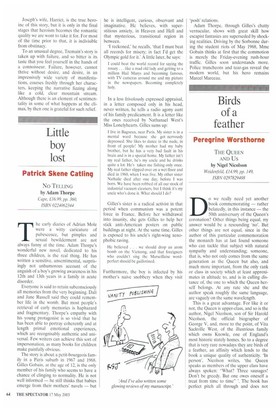Little boy lost
Patrick Skene Catling
No TELLING by Adam Thorpe Cape, £16.99, pp. 360, ISBN 0224062344 The early diaries of Adrian Mole were a witty caricature of pubescence, but pimples and sexual bewilderment are not always funny at the time. Adam Thorpe's wonderful new novel, dedicated to his three children, is the real thing. He has written a sensitive, unsentimental, surprisingly not unhumorous account of the anguish of a boy's growing awareness in his 12th and 13th years in a family in acute disorder.
Everyone is said to retain subconsciously all memories from the very beginning. Dali and Jane Russell said they could remember life in the womb. But most people's retrieval of early memories is haphazard and fragmentary. Thorpe's empathy with his young protagonist is so vivid that he has been able to portray coherently and at length primal emotional experiences, which are recognisably authentic and universal. Few writers can achieve this sort of impersonation, as many books for children make painfully obvious.
The story is about a petit-bourgeois family in a Paris suburb in 1967 and 1968. Gilles Gobain, at the age of 12, is the only member of his family who seems to have a chance of clinging to normality. He is not well informed — he still thinks that babies emerge from their mothers' navels — but
he is intelligent, curious, observant and imaginative. He believes, with superstitious anxiety, in Heaven and Hell and that mysterious, transitional region in between.
'I reckoned,' he recalls, 'that I must beat all records for misery; in fact I'd get the Olympic gold for it.' A little later, he says:
I could beat the world record for saying the rosary . .. like a mad old lady and getting to a million Hail Marys and becoming famous, with TV cameras around me and my picture in the newspapers. Becoming completely holy.
In a less frivolously expressed appraisal, in a letter composed only in his head, never written, he tells a radio agony aunt of his family predicament. It is a letter like the ones received by Nathanael West's Miss Lonelyhearts. Gilles sums up:
I live in Bagneux, near Paris. My sister is in a mental ward because she got nervously depressed. She likes to dance in the nude, in front of people! My mother had my baby brother, but he has a very bad fault in his brain and is in a special home. My father isn't my real father, he's my uncle and he drinks quite a lot. He's taken me fishing only once. My real father slipped over on a wet floor and died in 1960, when I was five. My other sister Nathalie died after one day, before I was born. We have been robbed of all our stock of industrial vacuum cleaners, but I think it's my uncle who's done it. What should I do?
Gilles's sister is a radical activist in that period when communism was a potent force in France. Before her withdrawal into insanity, she gets Gilles to help her stick anti-American posters on public buildings at night. At the same time, Gilles is exposed to his uncle's right-wing xenophobic raving.
He believed . . . we should drop an atom bomb on the Vietcong, and that foreigners who couldn't sing the Marseillaise wordperfect should be guillotined.
Furthermore, the boy is infected by his mother's naive snobbery when they visit 'posh' relations.
Adam Thorpe, through Gilles's chatty vernacular, shows with great skill how escapist fantasies are superseded by shocking realities. Driving by the Sorbonne during the student riots of May 1968, Mme Gobain thinks at first that the commotion is merely the Friday-evening rush-hour traffic. Gilles soon understands more. Police truncheons and tear-gas reveal the modern world, but his hero remains Marcel Marceau.


































































































 Previous page
Previous page